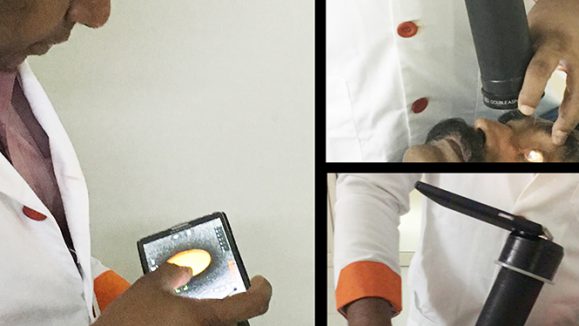If you’re under lockdown, just remember that it will end someday. For some of us, it’s difficult to remember how life used to be, but there are welcome signs of change. The British Prime Minister Boris Johnson reports that his country is past its peak — and even Italy, the worst affected country in Europe, is beginning to emerge.
Ophthalmology too will return to some form of normal again, but it will be a new normal. As countries and citizens begin to realize post-pandemic life will be different, so too must ophthalmologists.
Preparing for the New Normal

How different will ophthalmology be as an industry? We can say with certainty that travel to conferences and congresses is out for a long time. Frontline clinics will remain shuttered too, as social distancing rules make most routine treatments and check-ups impossible.
It’s the smaller clinics and businesses that will be most affected. While larger companies are more likely to have decent cash flow, smaller operations may find it more difficult to adapt to changing circumstances.
However, there are several companies that are finding ways to meet demand and succeed in the pandemic market.
The coronavirus crisis has caused an exponential rise in demand for both self-administered and single-use equipment. Anything that can be used by a patient at home is in high demand and is likely to remain a permanent feature of the ophthalmology industry post-pandemic. The longer a change in behavior remains in place, the more likely it is to become permanent.
Emerging from the Coronavirus Cocoon
For MacuLogix’s Senior Vice President of International Sales Armond Dantino, the crisis has brought unforeseen opportunity. His company manufactures the AI-powered AdaptDx Pro. Designed to test for age-related macular degeneration (AMD), the device’s portability is making it popular.
“The AdaptDx Pro is an amazing instrument as it is powered by Theia, our artificial intelligence onboard technician,” Mr. Dantino said.
“It is very intuitive. The physical technician will put it on the head of the patient and once secured in place, Theia takes it from there,” he said.
Mr. Dantino is convinced that MacuLogix is set to come out of the coronavirus crisis in a stronger position thanks to increased interest in the AdaptDx Pro. While it’s designed for use in a clinic, the device can be self-administered thanks to the Theia AI system. This makes it ideal for social distancing conditions.
The eyecups used by the AdaptDx Pro are also disposable, a feature now more valued than ever, due to coronavirus related hygiene concerns. Disposable equipment is selling like hotcakes amidst the crisis, particularly in Japan and the United States.
“AMD is such an important disease . . . but if detected early, it can be managed early. That is what we are trying to do — to save sight,” Mr. Dantino said.
Looking Forward with Hope
To continue saving sight, clinics will need to reopen. Like most countries and regions, cataract surgery in Missouri (U.S.) has dried up and emergency surgery has been cut by 20%. Missouri-based Katalyst Surgical, a manufacturer of titanium ophthalmic surgical instruments, is expecting a large increase in elective surgery post-lockdown to make up for the backlog.
Katalyst Surgical’s Vice President Alexander Bergoudian said his company preempted much of the worst effects of the crisis by allowing 50% of its staff to work from home. In many small businesses, cash flow is problematic even despite companies participating in the U.S. government’s Paycheck Protection Program. Designed to provide financial support to small businesses during the coronavirus pandemic, the program has been plagued by bureaucratic snafus and delays.
However, Mr. Bergoudian remains optimistic about his company’s future. He points to increasing international demand for surgical equipment in East Asian countries like South Korea. He expects this increase to make up for the domestic shortfall.
“Making retina and cataract instruments is very fine-tool type manufacturing and it’s important for us to keep our workforce prepared so that we can emerge from the crisis in good form as a company,” Mr. Bergoudian said.
“Cash flow is a challenge, however, I have seen things moving toward the positive. There is a lot of hope to look forward to,” he said.
Is Your Company Poised for Success?

Cautious optimism is becoming a trend in the ophthalmology industry, especially among equipment manufacturers. If governments are able to remove bureaucratic stumbling blocks, this mood will likely improve. For the time being, the prevailing advice among many ophthalmologists is to adapt as best as possible during the crisis.
For Mr. Dantino, it’s best to look at the positives. While some companies are facing challenges, many are rising to face adversity —something he believes will be healthy for business in the long run.
“If you are pragmatic, wise and manage your cash flow you will come out of this ready to be successful,” Mr. Dantino said.
“I am really proud of our company. We took action early, made the right steps and managed our expenses properly. We are now poised for success,” he added.
Editor’s Note: This story is part of the ‘Q&A from Quarantine’ series of PIE Talks, where Matt Young (CEO of Media MICE and Publisher of PIE and CAKE magazines), during the time of COVID-19 lockdown reached out to KOLs and industry friends to evaluate and discuss the impact of this pandemic to the ophthalmic world.




Nice article Matt